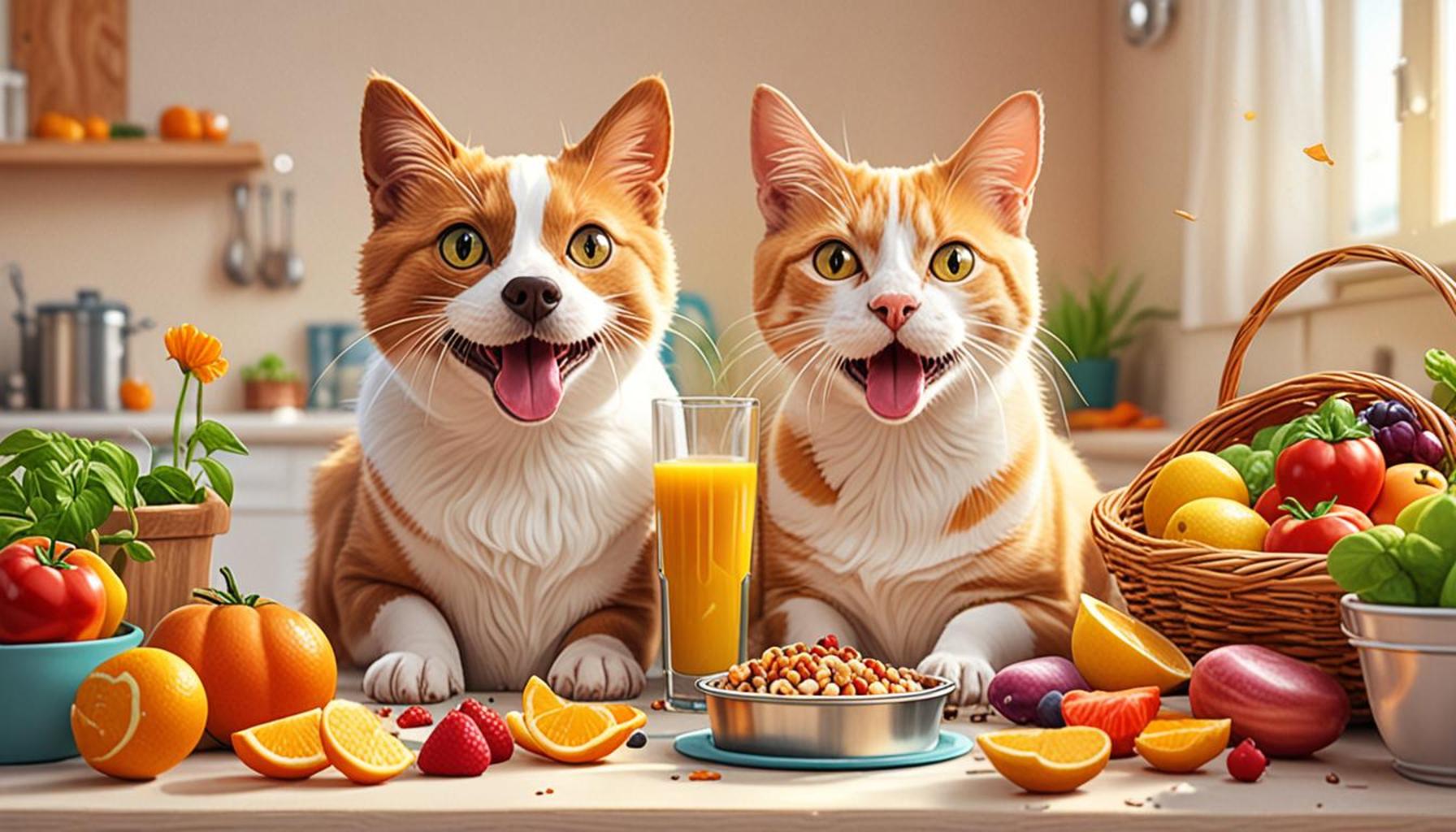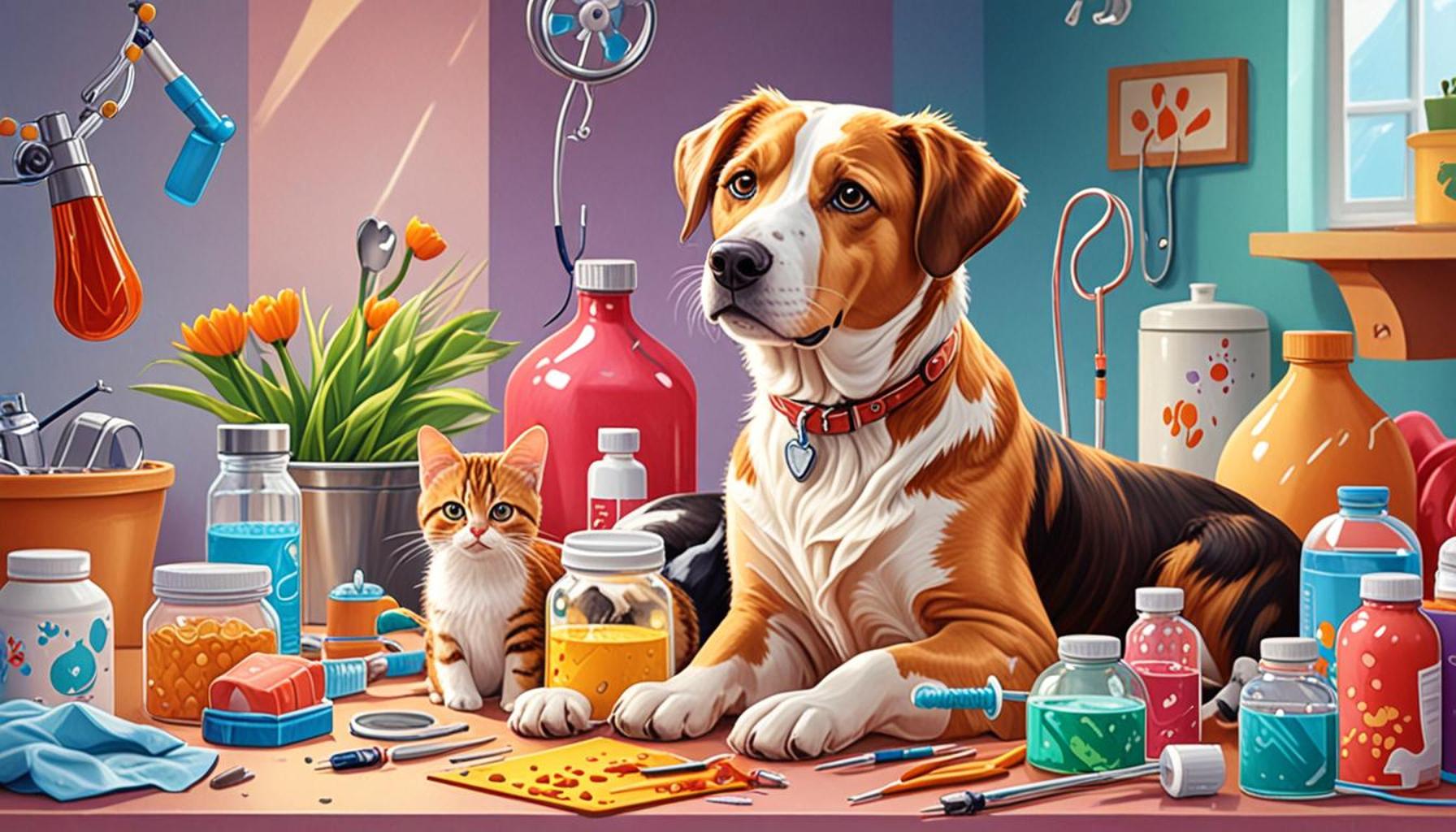Natural Feeding for Pets: Benefits and Challenges of Homemade Diets

Exploring the World of Homemade Pet Diets
As pet owners increasingly embrace natural feeding practices, the idea of homemade diets for pets is gaining significant traction. Many guardians are drawn to the notion that they can control every ingredient that goes into their furry friends’ meals. However, this approach presents both appealing advantages and considerable challenges.
Benefits of Homemade Diets
Switching to a natural feeding regimen can lead to numerous benefits. One key advantage is ingredient transparency, which allows owners to know exactly what their pets are consuming. For instance, with more pets experiencing food allergies or sensitivities, being aware of every component in their diet can make a significant difference. This transparency can reduce the risk of allergic reactions and promote better digestion.
Another substantial benefit is customization. Homemade meals can be tailored to meet specific dietary needs based on an individual pet’s health requirements, age, or activity level. For example, an active dog may require more protein to sustain energy, whereas an older pet might benefit from lower-calorie meals to help manage weight. Owners can incorporate ingredients that support their pets’ health, such as adding glucosamine-rich foods for joint support or high-fiber options for digestive health.
Moreover, quality control allows owners to choose ingredients based on quality rather than brand. Many commercial pet foods may contain fillers and preservatives that are not beneficial for pets. Opting to cook at home enables owners to select organic vegetables, high-quality meats, and wholesome grains, creating a nutritious meal that can potentially enhance their pets’ overall well-being.
Challenges of Homemade Diets
However, the journey to a homemade diet is not without obstacles. One of the most significant concerns is nutritional balance. Formulating a complete and balanced diet that meets all of a pet’s nutritional needs can be complex. For example, while a pet may enjoy chicken and rice, these ingredients alone do not provide the essential vitamins and minerals for overall health. Consulting with a veterinarian or a pet nutritionist is often necessary to ensure that all dietary requirements are met.

Additionally, preparing meals from scratch can be time-intensive. Busy schedules can make it difficult for pet owners to dedicate the necessary time to plan, shop for, and prepare homemade meals. This aspect can be particularly daunting for those who juggle work and family responsibilities.
Cost considerations also come into play. While some may find that cooking for their pets can save money, using high-quality ingredients, such as premium meats and organic vegetables, can sometimes lead to higher costs compared to purchasing commercial pet food. It is essential for owners to calculate these expenses and decide if the potential health benefits are worth the investment.
Delving into the realm of natural pet feeding invites many pet owners to rethink not just meal preparation, but overall pet health. Each decision has the potential to influence the vitality of our pets, making it crucial to weigh the benefits against the challenges. This article will explore the landscape of homemade diets, helping you navigate the exciting yet intricate world of natural feeding for pets.
FOR MORE TIPS: Click here to learn how to keep your pets safe and healthy at home
Understanding the Process of Homemade Pet Diets
Creating a homemade diet for pets requires a blend of culinary skill, nutritional knowledge, and a deep understanding of a pet’s individual needs. Owners often find immense satisfaction in knowing they are taking a proactive approach to their pets’ health, yet the complexities involved necessitate careful consideration.
Nutritional Considerations for Homemade Diets
To craft a suitable homemade pet diet, owners must prioritize nutritional balance. This involves understanding the essential nutrients pets require, including proteins, fats, carbohydrates, vitamins, and minerals. A well-rounded homemade diet might include:
- Proteins: Essential for growth and energy, common sources include chicken, turkey, fish, and legumes.
- Healthy Fats: Important for skin and coat health, sources include fish oil and flaxseed oil.
- Carbohydrates: Provide energy and aid digestion; brown rice, sweet potatoes, and oats are excellent choices.
- Vitamins and Minerals: Supplements or specific foods like leafy greens, carrots, and certain fruits ensure pets receive all necessary micronutrients.
Consulting a veterinarian or a certified pet nutritionist can greatly aid in formulating a diet that is both enjoyable and healthy. This step is crucial, especially for those unfamiliar with or uncertain about meeting their pets’ nutritional needs. As each pet is unique, professional guidance can pinpoint required adjustments to ensure optimal health.
Time and Preparation for Homemade Meals
Aside from nutritional expertise, pet owners must consider the commitment in terms of time and preparation. Making homemade pet food can be a rewarding yet time-consuming endeavor. Here are some factors to keep in mind:
- Ingredient Sourcing: Locating high-quality or organic ingredients may require planning and effort, including potential trips to specialty stores or farmers’ markets.
- Cooking Time: Preparing meals from scratch means dedicating time to cooking, which can vary depending on the complexity of the recipe.
- Storage and Portioning: Owners need to consider how to store meals, while also ensuring proper portion sizes for different pets, often based on weight and activity level.
Such time commitments can deter many owners. Without a structured plan, preparing homemade meals may feel overwhelming, particularly for those managing hectic daily schedules. It’s essential for pet owners to establish a routine that fits their lifestyle, which may include batch cooking or meal prepping to save time throughout the week.
Ultimately, understanding the nuances of homemade pet diets is crucial. The appeal of knowing exactly what goes into a pet’s food is undeniable, but the effort required to maintain nutritional integrity and meal planning is considerable. Balancing these factors will determine the success of transitioning to a homemade diet and whether it ultimately benefits both pets and their owners, leading to happier, healthier companions.
| Advantages | Details |
|---|---|
| Improved Nutritional Control | Making homemade diets allows pet owners to select high-quality ingredients that meet their pet’s specific nutritional needs, ensuring a balanced diet without unwanted additives. |
| Allergy Management | Homemade diets can help in identifying and eliminating allergens that may cause health issues in pets, offering customization that pre-packaged foods can’t provide, thus improving overall health. |
| Fresh Ingredients | Using fresh ingredients ensures that pets receive a diet free from preservatives and enhances the palatability, encouraging better eating habits. |
| Cost-Effectiveness | In some cases, preparing homemade meals can be more economical compared to commercial pet food, particularly for those who buy in bulk or use leftovers. |
Natural feeding for pets offers a world of potential benefits while simultaneously presenting challenges that must be thoughtfully navigated. Investing time in research is crucial to ensuring that your pet receives a balanced diet packed with essential nutrients. As you explore the idea of homemade diets for your beloved pets, consider how these advantages can play a pivotal role in enhancing their health and vitality. For instances of particular dietary needs or restrictions, understanding the core aspects of natural feeding can truly have lasting health implications. Exploring the science behind homemade diets reveals an evolving field where pet health meets culinary creativity, inviting dedicated pet owners to delve deeper into this rewarding journey.
DIVE DEEPER: Click here to learn more
Benefits of Homemade Diets for Pets
The allure of homemade diets for pets extends beyond the satisfaction of knowing what ingredients are used. Many pet owners tout various benefits associated with this approach, which often leads them to opt for natural feeding methods.
Improved Digestion and Allergies
One of the significant advantages of a homemade diet is its potential for improving a pet’s digestive health. Many commercial pet foods contain fillers, artificial preservatives, and additives that can lead to digestive issues and allergic reactions. By preparing homemade meals, pet owners can select high-quality, whole food ingredients that may reduce these risks. For instance, substituting grains or processed ingredients with highly digestible carbohydrates like sweet potatoes can often alleviate symptoms in pets with sensitivities.
Customized Nutrition
Another notable advantage of homemade diets is the ability to customize nutrients according to a pet’s specific needs. For example, pets with unique health conditions such as diabetes or obesity may benefit from a controlled carbohydrate intake and the inclusion of healthier fats and fibers. In contrast, young, active pets may require higher protein levels to support their energy levels. This level of customization is often difficult to achieve with store-bought pet foods, which have a one-size-fits-all formula. By partnering with a veterinarian or a pet nutritionist, pet owners can develop dietary plans tailored to individual health requirements.
Enhanced Palatability
Homemade meals often offer improved palatability compared to commercial options. Pets, like humans, prefer fresh and flavorful food. In many cases, homemade recipes featuring real meats, fresh vegetables, and herbs not only attract pets but also encourage better eating habits. One might discover that a pet who has been a picky eater thrives on a diet made of easily digestible and tasty ingredients. Incorporating variety without the use of artificial flavors can lead to a more enjoyable dining experience for furry companions.
Challenges of Homemade Diets for Pets
Despite the benefits, the transition to a homemade diet does not come without its challenges. Owners must navigate various hurdles to ensure their pets receive proper nutrition consistently.
Potential Nutritional Deficiencies
One of the most pressing concerns is the risk of nutritional deficiencies. Pet owners who lack nutritional knowledge may overlook essential vitamins and minerals, potentially leading to long-term health issues. For example, a homemade diet that lacks adequate calcium or vitamin D could result in skeletal problems, particularly in growing pets. This highlights the importance of consulting with veterinary professionals when designing a diet plan to mitigate the risk of missing key nutrients.
Cost and Accessibility
Cost is another notable challenge. High-quality ingredients for homemade diets can be more expensive compared to mass-produced commercial pet foods. This can pose a financial burden for some pet owners. For example, sourcing organic meats and seasonal vegetables may lead to a significantly higher grocery bill. Furthermore, the time required for meal preparation could dissuade individuals with busy lifestyles from sustaining homemade pet diets.
Trial and Error
Engaging in trial and error is often part of the process when introducing homemade diets. Some pets may be resistant to new foods, while others may not tolerate certain ingredients as expected. It can take time and effort to determine which combinations work best for individual pets. Owners must stay vigilant, monitoring their pets’ physical and emotional reactions to dietary changes and being prepared to adjust as needed.
In summary, the world of homemade pet diets presents both opportunities and challenges. Pet owners who are informed and prepared can make empowered decisions about what they feed their furry friends while navigating potential pitfalls along the way.
DISCOVER MORE: Click here for essential tips
Conclusion
In exploring the landscape of natural feeding for pets, namely through homemade diets, pet owners are met with a compelling blend of benefits and challenges. While the thought of providing freshly prepared meals might resonate with a desire to optimize a pet’s health, the reality involves a careful balancing act of nutrition and practicality. Understanding the potential for customized nutrition and the likelihood of improved digestion lays a foundation for informed choices. However, the risk of nutritional deficiencies and the often higher costs associated with high-quality ingredients cannot be overlooked.
The concept of trial and error also adds a layer of complexity that requires dedication and attentiveness from pet owners. As the journey of transitioning to homemade diets unfolds, constant adjustments may be necessary to ensure a pet’s dietary needs are met. Encouragingly, with the support of veterinarians and nutritional experts, pet owners can skillfully navigate these challenges and discover what works best for their furry companions.
Ultimately, natural feeding can lead to remarkable outcomes when approached thoughtfully. The commitment to understanding the dietary requirements and preferences of pets can lead to a happier, healthier life. As the bond between pet and owner strengthens through shared meals, so does the opportunity for enriching their lives together. Engaging with this topic further can unveil new recipes, nutritional insights, and community discussions, paving the way for empowered pet care choices that reflect both love and responsibility.


